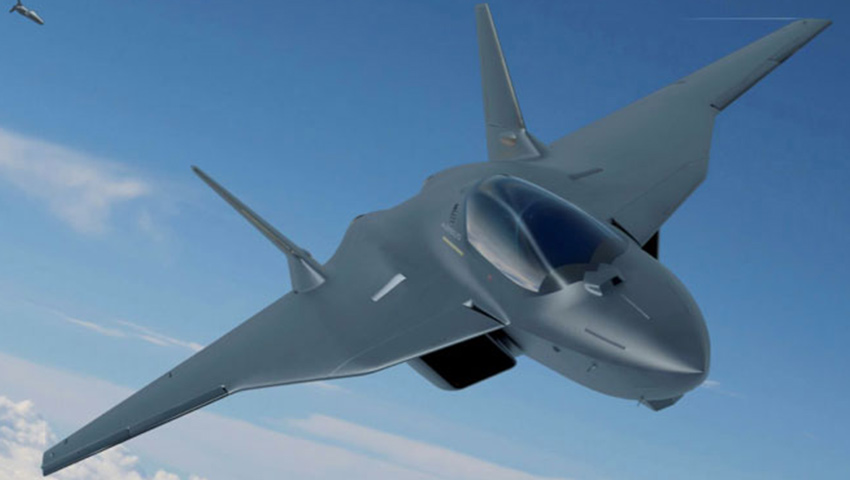Dassault Aviation and Airbus SE have delivered a joint industrial proposal to the governments of France and Germany for the first demonstrator phase of the Future Combat Air System (FCAS).
To continue reading the rest of this article, please log in.
Create free account to get unlimited news articles and more!
The joint industrial proposal is the next major milestone achievement in the program and was showcased by the reveal of the New Generation Fighter and Remote Carriers models to a world public on the opening day of the 2019 Paris Air Show.
The reveal of the models by Eric Trappier, chairman and chief executive of Dassault Aviation, and Dirk Hoke, CEO of Airbus Defence and Space, was witnessed by the host of the opening ceremony at Le Bourget airport, President of the French Republic, Emmanuel Macron, and the French Minister of the Armed Forces, Florence Parly, the German Federal Minister of Defence, Ursula von der Leyen and the Spanish Minister of Defence, Margarita Robles.
This Demonstrator Phase will cover the period between 2019 and mid-2021 and will serve as a starting point for demonstrators and technology development for a range of new aerial platforms to fly by 2026, including:
- New Generation Fighter (NGF);
- Remote Carriers (RC); and
- Air Combat Cloud (ACC).
The various teaming agreements, which also include the companies MBDA Systems and Thales, contain a defined scope of planning of the first demonstrator phase, ways of working and commercial agreements. Additionally, a transparent and fair handling of intellectual property rights has been established in the respective teaming agreements. In parallel, Safran and MTU are in charge of developing a new engine.
Trappier said, "The Joint Concept Study awarded to Dassault Aviation and Airbus in January 2019 was the first step in a fruitful co-operation between both companies.
"The first demonstrator phase marks another decisive step in the Next Generation Weapon System industrial organisation in which the New Generation Fighter, to be built by Dassault and Airbus, with Dassault Aviation as prime contractor, as well as the Remote Carriers and Air Combat Cloud with Airbus as prime contractor, will be the cornerstone of the Future Combat Air System."
Hoke reinforced the comments made by Trappier, saying, "I am very satisfied with the level of trust and partnership we have built with Dassault already in the execution of the Joint Concept Study, and now with the industrial proposal we’ve submitted to the both governments. The principles of our industrial cooperation include joint decision making, a clear governance set-up, transparent ways of working, and a common preparation and negotiation of this first phase of the demonstrator activities."
After initiating the negotiation phase through the delivered proposal, Dassault Aviation and Airbus expected a contract award for the first demonstrator phase by Q4 2019.
Additionally, France and Germany officially welcomed Spain as an industrial partner nation in the FCAS program – the agreement was announced by French Defence Minister Florence Parly, German Defence Minister Ursula von der Leyen, and Margarita Robles, Defence Minister for Spain, in the presence of French President Emmanuel Macron. Three Airbus home nations now form the core part of Europe’s most decisive military aviation program for the next decades.
Alberto Gutiérrez, head of military aircraft at Airbus Defence and Space, said, "Starting FCAS on a bilateral basis between France and Germany was important to kick-start the program and to get it on track. The integration of Spain now is a credible step forward towards the envisioned Europeanisation of FCAS.
"Not only is Spain one of Airbus’ founding countries but it’s also an industrial stronghold for military aircraft in our company. The country is a key contributor to Europe’s defence capabilities as well as an experienced and trusted partner in joint defence programs. So we’re not only glad to see Spain join FCAS, we also believe it is a natural evolution for the program."
Australia's industrial capability and value adding capacity as developed throughout the F-35 program places Australia in an ideal position to integrate and participate in the development of any number of sixth-generation fighter designs to ensure continued air combat capability and interoperability with key regional and global allies in increasingly contested environments, beyond 2030.
FCAS is expected to enter into service by 2040 and has been designed to be more than a combat aircraft. The FCAS is expected to serve as part of a system of systems, consolidating an array of interconnected and interoperable elements, including unmanned medium altitude, long endurance (MALE) drones, the existing fleet of Eurofighter and Rafale fighter aircraft, cruise missiles and drone swarms.
The FCAS system will serve as a critical component of a connected and interoperable system with a vast perimeter of specialist mission aircraft, satellites, NATO systems and a distributed network of land and naval combat systems. FCAS is designed to assure European autonomy in the air and space domain, while enhancing existing political, strategic and industrial partnerships in Europe.
Airbus is a global leader in aeronautics, space and related services. In 2018 it generated revenues of € 64 billion and employed a workforce of around 134,000. Airbus offers the most comprehensive range of passenger airliners. Airbus is also a European leader providing tanker, combat, transport and mission aircraft, as well as one of the world’s leading space companies. In helicopters, Airbus provides the most efficient civil and military rotorcraft solutions worldwide.
With over 10,000 military and civil aircraft (including 2,500 Falcons) delivered in more than 90 countries over the last century, Dassault Aviation has built up expertise recognised worldwide in the design, development, sale and support of all types of aircraft, ranging from the Rafale fighter to the high-end Falcon family of business jets and military drones. In 2018, Dassault Aviation reported revenues of €5.1 billion. The company has 11,500 employees.

 Login
Login







